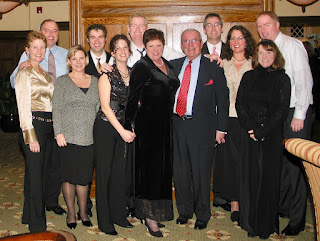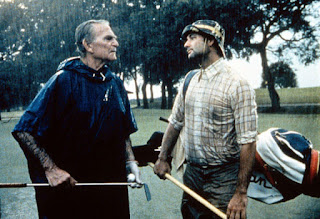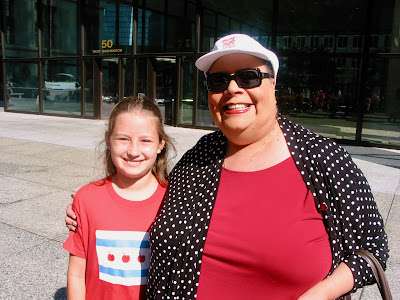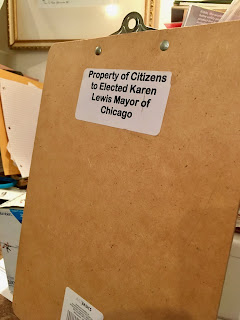I didn’t know much when I was 22 years old, but one thing I knew with an almost evangelical certainty was that I didn’t need a new dad.
My father dropped dead when I was 14 years old, leaving my then 37-year-old mother to raise my four little brothers and me.
Three years later, I headed off to college, living day-to-day without any goals, plans, or focus. My undergraduate transcript remains Exhibit A for those Lost Years. Suffice it to say there are no buildings, classrooms, or outdoor benches named after me on the campus of Northwestern University.
Because I was living in Evanston, roughly an hour away from our home in west suburban Villa Park, I was able to come home a fair amount during my college years to see my family and watch my brothers’ basketball games.
Around the beginning of my junior year, I learned from one of my brothers that my mom had started dating someone. My mom confirmed this the next time she and I talked, but she didn’t provide many details.
I met the man in question during my next trip home that fall. His name was Tom Sweeney (same first name as my father, both of my grandfathers, one of my uncles, and one of my little brothers), and my initial read on him was that he was polite and could hold up his end of a conversation. Beyond that, I reserved judgment.
He was divorced and he had two sons, who were roughly the same ages as the two oldest Farmer boys. He also had a daughter, but she had passed away several years earlier.
The relationship between my mom and Tom continued throughout the balance of my undergraduate years. I never asked too many questions, but my mother did appear to enjoy Tom’s company.
However, my youngest brothers, who by the mid-1980s were high school students, seemed somewhat less enamored of the new guy and his Marine Corps tendencies.
It was a basic clash of cultures. The Farmer household had long been a loose and informal operation, and my brothers and I didn’t want or need anyone with a slight authoritarian bent upsetting the status quo.
Of course, I wasn’t around much, so it was my little brothers who really bore the brunt of the order and formality the new guy was pushing during his increasingly frequent visits to our house.
I graduated from Northwestern in June 1986, and it was toward the end of my college career that I learned my mom and Tom had planned an October wedding. I was not thrilled by the news, no doubt because I was an aimless, self-centered 21-year-old, and my mother’s happiness was not something I thought much about at that time.
In fact, a few weeks after receiving my diploma, I packed a bag, borrowed a friend’s acoustic guitar (I was determined to learn how to play), and took off. I spent the better part of the next three years bouncing around the United States, working odd jobs and living with friends.
When I did come home for stretches of time -- usually to make quick money as a caddie -- I suddenly had to deal with Tom’s questions about my plans (both short- and long-term) for the future.
I dutifully came home to attend the wedding in October 1986, but it was not an event about which I was excited. Looking back, I wish I’d had the grace and big heart of my dad’s dad, who walked my mother down the aisle of the church that day.
I took some selfish comfort at the reception that evening when one of my mother’s longtime girlfriends (dating back to their high school days) gave me a big hug and told me, “Matt, I always thought the world of your dad; don’t make it too easy on this guy.”
Thinking today about that comment, I have to laugh, because Tom eventually won over both my mom’s girlfriend and me.
Indeed, within a few years of the wedding, the Farmer boys, my mother, and Tom Sweeney had reshaped our old status quo into a new one that worked well for the next few decades. We boys grew up and (more or less) stopped acting like knuckleheads, and Tom got more comfortable going with the flow when it came to my brothers and me.
Looking back over the last 30-plus years, I’m hard-pressed to recall even a single tiff Tom and I had after I started law school in August 1990. He and my mother had a lot of good times together, and they both relished their roles as grandparents to eighteen grandchildren.
About six years ago, Tom moved into a nursing home in west suburban Wheaton. My mother followed roughly a year later.
Until the pandemic hit, I did my best to get out there once a week to visit and to play music for them and their fellow residents. And whenever the nursing home could come up with a little bit of money, I’d bring with me some of my professional musician friends to class up my act.
Tom was a keen listener, and he would often ask me about certain songs as I packed up my equipment. One song that he quickly took to was “The Dutchman,” which has long been a favorite of mine.
It’s a song about a man (“the Dutchman”) who is growing old, losing his faculties, and being cared for by a woman named Margaret, who loves him deeply.
It was always a tough one for me to sing at the nursing home because I was playing it in front of my mom and Tom, both of whose minds and bodies were beginning to fail.
But Tom continued to request the song, and it dawned on me later that his attachment to it might have had something to do with the fact that for many years he called my mother (whose name is Eileen) Margaret.
It was a nickname that grew out of a vacation they took together back in the late 1990s. My mom and Tom evidently spent some time with a guy in Florida who incessantly summoned his own wife (whose name was Margaret) with braying demands for her attention. “Margaret, come over here.” “Margaret, I need my glasses.” “Margaret, what time is dinner?”
My mom and Tom must have found this amusing, because after returning home from their trip, Tom often called my mother Margaret, and she unfailingly answered to that nickname.
Tom passed away a few months ago, and the Sweeney family recently hosted a Celebration of Life event for him. I asked Tom’s oldest son if I could play a song at the event, and he graciously agreed. I told the folks who gathered that afternoon the story of Tom and “The Dutchman,” and I then played the song.
Given that my mother, who still resides at the nursing home, doesn’t remember much these days, it was especially tough to get through the chorus, which ends with the line, “Long ago I used to be a young man, and dear Margaret remembers that for me.”
Since I had, on several occasions, played that song at the nursing home with my good buddy (and ace guitarist) Steve Doyle, I recently talked Stevie into recording a version with me in my basement as a musical tribute to Tom Sweeney.
Tom was the dad 22-year-old me didn’t need, but 59-year-old me is happy to have had for over 35 years.
And despite our many youthful clashes with him, Tom quickly figured out that he could always count on the Farmer boys.

















